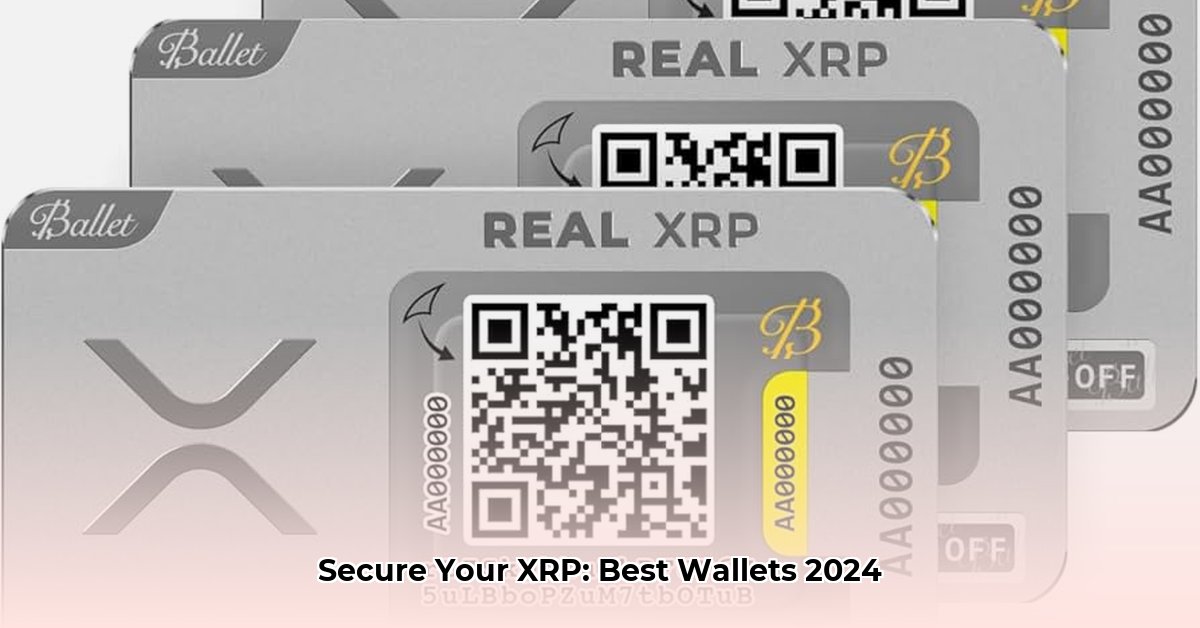
Choosing the right wallet for your Ripple (XRP) is crucial for safeguarding your digital assets. This comprehensive guide explores various XRP wallet types, compares popular options, and provides actionable security advice for users of all levels. We'll cover security protocols, user experience, and cost-effectiveness to help you make an informed decision. For more information on choosing the right wallet for other cryptocurrencies, check out this helpful resource on finding the best wallet.
Understanding Your XRP Holding Strategy
Before selecting a wallet, consider your XRP usage. Are you a frequent trader needing quick access, or a long-term holder prioritizing maximum security? This decision significantly influences your wallet choice. For instance, a high-frequency trader might prioritize ease of access over absolute security, whereas a long-term investor would likely place paramount importance on the security of their holdings. How often do you plan to interact with your XRP?
Types of XRP Wallets: A Detailed Overview
Several wallet types cater to diverse needs and technical proficiencies. Let's review the key options:
Hardware Wallets: Maximum Security, Offline Protection
Hardware wallets are physical devices that store your private keys offline, offering superior security against hacking and malware. They function as offline vaults for your crypto assets. Leading examples include Ledger and Trezor. While offering robust security, they often come with a higher price tag; however, is this added investment worth the peace of mind?
Software Wallets: Convenient Access, Enhanced Vigilance Required
Software wallets are applications installed on your computer, tablet, or smartphone. They provide convenient access to your XRP but require careful security practices due to their internet connectivity. Popular choices include Exodus and Atomic Wallet. They provide a balance between ease of use and security but require users to maintain diligent security habits. What security measures should you prioritize when using a software wallet?
Paper Wallets: Low-Tech Simplicity, High Security Risk (If Mismanaged)
Paper wallets involve printing your private keys onto paper. They provide offline security, but are susceptible to loss, damage, or theft. Therefore, they're best suited for long-term storage of smaller amounts of XRP, acting as backups, rather than for regular transactions. How can you mitigate the risks associated with paper wallets?
Exchange Wallets: Trading Convenience, Security Trade-Offs
Exchange wallets are provided by cryptocurrency exchanges like Binance or Coinbase. They offer easy access for trading, but you relinquish direct control over your private keys. The exchange's security becomes the primary safeguard for your XRP. This convenience comes at the cost of reduced control and heightened reliance on the exchange's security measures. How do exchange wallets compare regarding security and accessibility?
Comparative Analysis: Top XRP Wallets Head-to-Head
The following table compares popular XRP wallets across key features, highlighting their respective strengths and weaknesses. Remember, specific details might change over time; always conduct your own research before making a decision.
| Wallet Type | Example Wallets | Security Level | Ease of Use | Cost | Pros | Cons |
|---|---|---|---|---|---|---|
| Hardware Wallets | Ledger Nano S Plus, Trezor | Extremely High | Moderate | Higher | Maximum security, offline protection, reduced hacking risks | Higher upfront cost, steeper learning curve |
| Software Wallets | Exodus, Atomic Wallet | High (with precautions) | High | Often Free | User-friendly interface, multi-currency support | Susceptible to malware if not properly secured |
| Paper Wallets | Self-generated | High (if stored safely) | Low | Very Low | Extremely secure when properly stored, offline storage | Prone to loss, damage, or theft; impractical for regular transactions |
| Exchange Wallets | Binance, Coinbase | Moderate to High | High | Variable | Convenient for trading, simple access | Security dependent on the exchange; you do not directly control private keys |
Security Best Practices: Protecting Your XRP Investment
Regardless of your chosen wallet type, implementing robust security measures is paramount.
Strong Passphrases: Utilize long, complex, and unique passphrases; avoid easily guessable words or sequences.
Two-Factor Authentication (2FA): Always enable 2FA for an added layer of protection against unauthorized access.
Regular Software Updates: Keep your wallet software and any associated applications updated to patch security vulnerabilities.
Phishing Awareness: Be wary of suspicious emails or websites. Never share your private keys or seed phrase.
Offline Backup: Create a backup of your seed phrase and store it securely offline, separate from your wallet.
Choosing the Right XRP Wallet: Tailored Recommendations
The optimal wallet choice depends on individual needs and risk tolerance.
Beginners: A user-friendly software wallet like Exodus provides a good starting point, allowing you to grasp fundamental security practices before progressing to more advanced options.
Experienced Users with Significant Holdings: A hardware wallet like Ledger or Trezor offers the highest level of security for substantial XRP holdings, justifying the higher cost.
Active Traders: While exchange wallets offer convenience, carefully assess the exchange's security track record before entrusting your assets.
Remember, the security of your XRP is paramount. By carefully evaluating the options and implementing strong security practices, you can effectively protect your digital assets. Choose wisely!